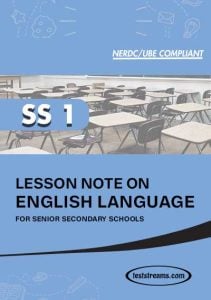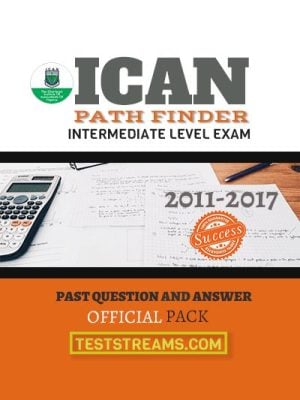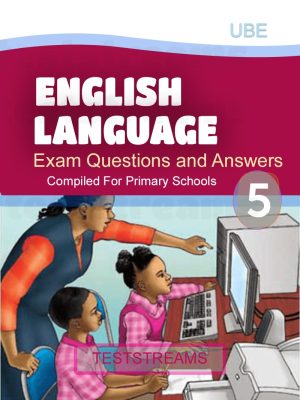This ENGLISH LANGUAGE Lesson Note was pulled from our book (Lesson Note on ENGLISH LANGUAGE for SS1 MS-WORD); Compiled to serve as reference material to help teachers draw out their lesson plan easier, saving you valuable time to focus on the core job of teaching.
This ENGLISH LANGUAGE Lesson Note Covers The Following Topics
- NOUNS: AND SPOKEN ENGLISH: MONOTHONGS
- ADJECTIVES AND ADVERBS; ORAL: TRIPHTHONG
- VOCABULARY: WORDS ASSOCIATED WITH FISHING; STRUCTURE: KINDS OF SENTENCE
- WORDS ASSOCIATED WITH AGRICULTURE; COUNTABLE AND UNCOUNTABLE NOUNS; DIPHTHONG
- TYPES AND FUNCTIONS OF CLAUSES; SYLLABIC CONSONANTS: /L/ AND /N/
- INTRODUCTION TO ANSWERING COMPREHENSION QUESTIONS AND NOMINALIZATION OF ADJECTIVES
- IRREGULAR VERBS
- VOCABULARY ASSOCIATED WITH LIBRARY AND FIGURES OF SPEECH
- COMMON MISSPELLED WORDS; THE USE OF THE DICTIONARY; IDIOMS
- SUMMARY: PRACTICAL APPROACH TO WRITING GOOD SUMMARY; WORDS ASSOCIATED WITH ADVERTISING; ADJUNCTS
- SUMMARIZING TO IDENTIFY THE WRITER’S PURPOSE; WORDS ASSOCIATED WITH STOCK EXCHANGE; HOW TO WRITE AN ARTICLE
- DIFFERENTIATING BETWEEN MAIN AND SUPPORTING IDEAS; WORDS ASSOCIATED WITH GOVERNMENT AND POLITICS; CONSONANT CLUSTERS, WRITING SKILLS AND WORD INFERENCE
- WRITING SKILLS: SCANNING, STRUCTURE: CONJUNCTS, DISJUNCTS, DETERMINERS AND QUALIFIERS.
- SKIMMING AND SCANNING; PUBLIC SPEAKING; CONJUNCTS AND DISJUNCTS; PHRASAL VERBS
- PLURAL FORMS OF NOUNS; CHARACTERISTICS OF DIFFERENT WRITING STYLES; QUESTION TAGS AND HOMOPHONES
- UNDERSTANDING THE RELATIONSHIP BETWEEN A WRITER’S PURPOSE AND TONE
- HOMOPHONES
- SPOKEN ENGLISH: CONSONANT SOUNDS FOLLOWED BY /KW/; PUNCTUATION; DIFFERENCES BETWEEN COMPOUND AND COMPLEX SENTENCES
- SUMMARY WRITING
- PREFIX AND SUFFIX
- PREPOSITIONS AND PREPOSITIONAL PHRASES
- SYNONYMS AND SYLLABLE
- PHRASAL VERBS AND COMPREHENSION
- AUXILIARY VERBS (WILL & WOULD) AND INTONATION
- AUXILIARY VERBS (SHALL & SHOULD), WORD REGISTER, AND SPEECH WRITING
- WRITING: SEMI-FORMAL LETTER
- HOMOPHONE AND PUNCTUATION MARKS
Sample note
Week 1
Topic: Review of Word Class (Parts of Speech); Oral: Review of Vowel and Consonant Sounds
Introduction
The indispensable aspect of a language you cannot ignore if you want to be an authority in the language are the Parts of Speech.
A part of speech is a category into which words are placed according to the work they do in a sentence. Every word that makes up a sentence, phrase or clause belongs to a part of speech. The eight parts of speech are presented to you on a platter of gold, with their definitions, types, functions, examples and how to use them. Just click on the links to see everything you want to know about the different part of speech.
Parts of Speech
Grammar Clinic: Part Of Speech (Noun)
Grammar Clinic: Part of Speech (Pronoun)
Grammar Clinic: Parts of Speech (Adjective)
Grammar Clinic: Part of Speech (Verb)
Grammar Clinic: Part of Speech (Adverb)
Grammar Clinic: Part of Speech (Preposition)
Grammar Clinic: Part of Speech (Conjunction)
Grammar Clinic: Part of Speech (Interjection)
Oral: Review of Vowel and Consonant Sounds
A vowel is a speech sound made by allowing breath to flow out of the mouth,without closing any part of the mouth or throat (although the lips may move to create the correct sound, as in creating the sound“o”). Letters of the English alphabet that represent vowels: a, e, i, o, u, and sometimes y.
A consonant is a speech sound made by partially or completely blocking the flow of air through the mouth (using the lips, teeth,tongue, and palate). Letters of the English alphabet that represent consonants include all the letters that are not vowels. Examples:b, d, k, s.The letter “y” makes a consonant sound when it appears at the beginning of words(examples: yellow, yacht), and it makes a vowel sound when it appears at the end of words (examples: valley, fairy). This dual role explains why the letter y is considered as only sometimes a vowel. Once students know that vowels are a, e, i,o, u, and sometimes y, and that consonants make up all the other letters, they can usually easily group the letters of the alphabet into vowels and consonants.However, there are vowels and consonants that sound like each other in certain words in English. Students speaking or hearing these vowels and consonants can sometimes find it difficult to distinguish between them, and that makes these vowels and consonants especially challenging as well as interesting. Here are some examples:
What happens when what looks like a vowel does not sound like a vowel? For example, the u in “unicorn” makes a consonant sound and is usually precededby “a,” not “an,” in the English language— people say “a unicorn,” not “anunicorn.” An even more interestingexample is the word “unununium” (an artificially produced radioactive element,pronounced yoon-yoon-yoo-nee-um,with the accent on the “yoo”). In addition,the o in “one,” “ouananiche” (a type of landlocked salmon, pronounced wan-an-ish, with the emphasis on the “ish”), and“Ouija” (a trademark for a spiritual and telepathic game board, pronounced wee- jee, with the emphasis on the “wee”),makes a consonant sound. The “w”sound in ouananiche and Ouija is actually made by the combination of the letters o and u.
What happens when what looks like a consonant does not sound like a consonant? For example, the h in “hour”is silent, so the word “hour” begins with a vowel sound and is usually preceded by“an,” not “a,” in the English language —people say “an hour,” not “a hour.” Other examples: honorary, honesty.

Get the complete Lesson Note with more content at very affordable price. Lesson Note on ENGLISH for SS1 MS-WORD- PDF
![]()







